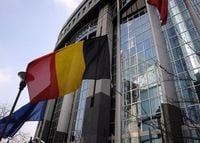Belgium is poised to take a leading role in establishing an international coalition aimed at preserving frozen Russian assets if European Union (EU) sanctions are not renewed this summer. This was announced by Belgian Foreign Minister Maxim Prevo in an interview with Euractiv.
Currently, the Belgian clearing center Euroclear holds the largest portion of frozen Russian assets in Europe, amounting to over €180 billion (approximately $202 billion) in state and private funds. These assets were blocked following Russia's full-scale invasion of Ukraine in February 2022.
As the deadline for reviewing EU sanctions approaches, which must be completed by the end of July, there is growing concern among EU diplomats that Hungary may impede the renewal process. The decision to extend sanctions requires unanimous approval from all 27 EU member states.
Prevo emphasized that Belgium is exploring various strategies to ensure these assets remain frozen if sanctions are not extended. "In such a case, it's necessary to find an alternative that will allow the assets to remain frozen. This could involve a new international legal initiative that obliges these funds to be held in Euroclear, or a national decision by the Belgian parliament," he stated.
He further clarified that Belgium does not intend to act unilaterally in this matter. "We cannot assume all risks—neither legal nor financial. A collective decision is essential. We aim to create a 'coalition of the willing'—this time to keep Russian assets frozen," Prevo reiterated.
The Belgian government is already conducting a legal analysis of the situation, as there could be potential lawsuits from Russia if actions are perceived as contrary to international law. Prevo remarked, "We do not want to be left alone with EU support only in words. Clear written commitments from other countries are needed—not just EU members, but possibly the UK, Canada, and other allies."
When asked whether the EU might lift sanctions under pressure from the United States, Prevo responded, "I don't think so. Unless it is part of an agreed peace process with the consensus of all parties. If someone just calls and asks, the answer is definitely no."
Regarding the potential use of frozen Russian assets to support Ukraine, Belgium is taking a cautious stance, given that a significant portion of these funds is stored within its borders. Prevo stated, "Honestly, our first priority is to keep the assets in a frozen state. The simplest path is unanimous approval of the 17th sanctions package. But we understand the risk: one or two countries could derail this decision."
According to anonymous sources among EU diplomats, Hungary is not expected to oppose the adoption of the 17th sanctions package against Russia. Officially, new restrictions could be approved in May 2025.
In light of the ongoing discussions, Spain's Economy Minister Carlos Cuevas has proposed creating a fund using the frozen assets of the Central Bank of Russia to finance large European defense projects and military assistance to Ukraine. Reports from late February indicated that Russia might agree to the use of $300 billion of assets frozen in Europe for Ukraine's reconstruction, provided that part of the funds is allocated for restoring occupied territories.
As the situation evolves, Belgium's proactive approach to maintaining frozen Russian assets highlights the complexities of international diplomacy and the delicate balance of geopolitical interests. With significant financial stakes involved, the coming months will be crucial in determining the fate of these assets and the broader implications for EU-Russia relations.





